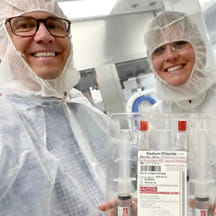Five-year-old Brynn Schulte loves grooving to Shake It Off, even if it annoys her brothers who would rather just play fight. Really there isn’t a dance she doesn’t like, but at school her favorite might be the Hokey Pokey. That’s what it’s all about, after all.
As Brynn bops with her kindergarten classmates or wrestles her two older brothers, you’d never know she’s on life support.
The permanent port in her chest tunnelling directly to her heart is just another accessory to her, like her unicorn earrings or pink ponytail scrunchy. Every other day, her mother injects medicine into the port that helps her blood clot, without which she will die. After she gets her injection, Brynn chooses the bandage to cover the port — kitty cats are her favorite.
Though managing her rare disorder that causes blood clotting problems has become normal for Brynn and her family, the process is anything but. The Cincinnati Children’s home care specialty pharmacy team must make sure the medication is delivered to the family every four weeks, coordinate insurance, get refill permissions, monitor labs, adjust doses, and check in with the family every week to address any needs and care for the port.
Any hiccup along the way could be dire.
“For Brynn, this is life and death,” her mom Lindsay said. “We can’t have a mistake.”
The medication Brynn relies on, called Corifact, is considered a specialty medication. This family of drugs isn’t clearly defined, but in general they treat complex or rare conditions, require special storage, handling, or administration, and are distributed only through specially licensed pharmacies.
Also, they’re expensive.
Some cost hundreds of thousands a year; many cost five figures. Hospitals buy the medicine upfront and bill insurance later to be reimbursed. At Cincinnati Children’s, around 70% of patients use Medicaid, which is notorious for underpaying hospitals. Cincinnati Children’s also provides home nursing services to support pharmacy patients like Brynn, and those services often aren't reimbursed at all.
Discounts provided under a federal program for safety-net providers called 340B are vital to the hospital's ability to provide the full spectrum of specialty pharmacy services to kids regardless of their ability to pay.
If the specialty pharmacy was shuttered, Brynn and at least 900 more children in the hospital’s service area would be forced to use one of the large, remote corporations that serve tens of millions of people and lack an integrated team of pediatric experts located a few miles away.
“This pharmacy is my family. I know them all by name. They’re so invested in her, in us,” Lindsay said. “They are the reason Brynn is happy, healthy, and can live a full life.”

What is 340B?
Section 340B of the Public Health Service Act requires pharmaceutical manufacturers that participate in Medicaid to sell outpatient drugs at a discount to health care organizations that serve a large percentage of uninsured and low-income patients.
As safety net providers that treat patients regardless of their ability to pay, children’s hospitals are included in the program. Fifty-four children’s hospital’s participate in 340B. The program enables hospitals to stretch resources and offer patients benefits and services using funds that would have otherwise been spent on outpatient medications.
More than a transaction
When a patient gets a prescription for a specialty medicine, a lot has to happen before it is administered to the patient. The pharmacy must evaluate the order to ensure it's appropriate; review medical, surgical, and medication history; process labs; verify immunizations; check insurance eligibility and apply for approval (which requires an arduous prior authorization process); connect the family to copay assistance and other financial resources; and educate and train the family on how to administer the medication.
For the family, all of that comes on top of a new diagnosis, often right after experiencing a traumatic emergency. It was after a terrifying, life-threatening brain bleed that Brynn’s family learned she had a condition that must be treated almost daily for the rest of her life.
“It’s so overwhelming and scary for families,” said Tracy Matheny, program manager of Cincinnati Children’s specialty pharmacy. “They have to deal with managing the medication in addition to processing the way the diagnosis will forever change their lives.”
One of the first hurdles families encounter is a complex insurance maze with disorienting terms like “maximizers” and “accumulators” and “alternative funding plans.” Their medication may be covered, or it may not. It may require a copay, or it may not. It all depends on the payor’s formulary (a list of approved medications), which varies from payor to payor and continually changes.
“These complexities can prevent families from getting access to these medications in a timely fashion and is a real hardship,” Matheny said. “With big box pharmacies we see that families have to jump through hoops in order to get their child's medication.”

Many kids waiting for these drugs suffer from conditions that are painful, dangerous, and sometimes debilitating, like juvenile arthritis, cystic fibrosis, and multiple sclerosis. Without medicine, they can’t sleep. They can’t go to school. The condition may progress, causing irreversible damage to joints or organs.
And kids like Brynn could die. Many specialty medications treat deadly conditions like blood disorders, diabetes, and cancer.
As Matheny works to secure financial assistance, Cincinnati Children’s dispenses the drug to the patient without waiting and without upfront payment from the patient, taking on the financial liability to ensure the child gets what they need quickly.
“My job is helping families walk this path of a diagnosis and making sure their child has what they need to have the best outcomes at home,” Matheny said. “We make sure they receive all the support they need to get their child’s lifesaving medicine.”
Once the patient is on the medicine, having the pharmacy under the children’s hospital umbrella means they get fully integrated care, resulting in safer and more efficient treatment. Pharmacists have access to the patient’s electronic medical record, with real-time lab results and progress notes, and are in constant contact with the hospital staff involved in the patient’s care.
“Whenever there's a problem, we are able to resolve it much faster than an outside pharmacy would,” said Specialty Pharmacy Manager Amanda Fridley.
'This pharmacy is my family. They are the reason Brynn is happy, healthy, and can live a full life.'
Because Brynn’s port is a direct line to her bloodstream, she must seek medical care whenever she has a fever. That means a trip to the emergency room a few times a year, where Lindsay knows the Cincinnati Children’s team will be ready to meet Brynn’s needs.
“I call and everybody knows about it within an hour because of our close relationship with the pharmacy team,” Lindsay said. “The care is seamless and gives me so much peace of mind.”
Then there’s the pediatric aspect of specialty medication management. Children’s bodies metabolize drugs differently, present symptoms differently, and decompensate differently than adults. Dosing is a highly delicate balance that changes continually and requires frequent monitoring. Many disease states are not the same and some are extremely rare, requiring specialized expertise.
“When most people think of pharmacy, they think of a simple transaction: Here’s a prescription, here’s the medicine, follow the instructions on the bottle,” said Fridley. “For specialty medicine, especially in pediatrics, there’s so much involved to make sure the patient is safe and thriving."
Protecting 340B
The number of specialty pharmacies in the U.S. has dwindled over the last decade, with three mammoth companies accounting for more than two-thirds of the entire specialty medication market.
Nonprofit children’s hospital specialty pharmacies like Cincinnati Children’s are essential to ensuring healthy outcomes for children who rely on specialty medications. Proposed changes to 340B would force these pharmacies to bear an unsustainable financial burden.
That means children like Brynn Schulte would have their lives put in the hands of national conglomerates.
“We need the pediatric experts. We need the personal care,” said Lindsay. “We couldn’t do this with a different pharmacy.”


